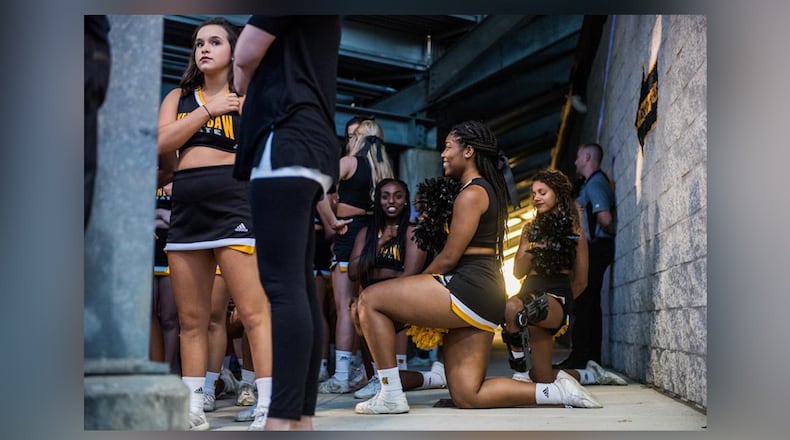The representatives of a Kennesaw State University cheerleader who knelt during a football game two years ago to protest police misconduct and one of her chief critics are both claiming victory now that the state has negotiated a $145,000 settlement in her civil rights lawsuit.
The student, Tommia Dean, argued university athletics officials — under pressure from some local elected officials — violated her speech rights by telling her and four other African American cheerleaders they could no longer be on the field during the national anthem after their first kneeling protest.
Credit: ABC News
Credit: ABC News
KSU later reversed course, and a University System of Georgia report that November concluded KSU did not follow the system's guidance that such protests were protected by the U.S. Constitution and should not be interfered with, unless they cause a disruption.
The state’s Department of Administrative Services agreed to the settlement late last month. The financial terms were released last week: About $93,000 goes to Dean and nearly $52,000 goes to her legal team.
>> PREVIOUS REPORTING | KSU cheerleaders kept off field after some knelt during national anthem
The cheerleader protests added to the national debate, led by then-pro football quarterback Colin Kaepernick in 2016, about the appropriateness of “taking a knee” during the anthem to protest police misconduct and racial discrimination. The agreement has sparked a conversation about the legacy of the cheerleaders’ actions, and the lawsuit.
Dean’s attorney, Randy Mayer, said Monday the agreement “has validated the rights of what she did. Protest is honored, as it should be.”
One of the original lawsuit defendants, Earl Ehrhart, also declared victory, saying the claims against him were dismissed during the proceedings.
Ehrhart was a state representative from an area near the campus when the cheerleaders first protested. He and Cobb County Sheriff Neil Warren complained about their actions to then-university President Sam Olens, according to documents first obtained by The Atlanta Journal-Constitution in 2017.
In February, a federal judge dismissed Ehrhart and Warren as defendants in the case, finding no evidence they acted with racial animus. Dean's team appealed the Ehrhart dismissal in June. Ehrhart denied any liability in the agreement, which permanently resolves "disputes between Dean and Ehrhart."
>> READ | Part of KSU cheerleader’s lawsuit dismissed against sheriff, ex-lawmaker
“I won tremendously,” Ehrhart said in an interview Monday. “I proved the lawyers’ claims were lies. If I had to do it over again, I would have done the same thing.”
Ehrhart says KSU restricts access to who can be on the field, so demonstrations of any kind should be prohibited. He believes the most appropriate place for such student protests is locations on campus where the university sets aside space for demonstrations.
"I want (students) to have the freedom to do anything they want on a part of campus where everyone can do it," said Ehrhart, who decided not to run for re-election in 2018.
Mayer said the cheerleaders were within their constitutional rights to demonstrate on the field and were not trying to be disrespectful by kneeling during the anthem, saying the American flag “belongs to all of us.”
The dispute led to protests against Olens, who resigned in February 2018. Only one of the five cheerleaders rejoined the squad the following year. Despite the protests, KSU's African American enrollment increased from about 7,700 students in 2018 to nearly 8,300 students this fall, state records show.
Dean, a senior considering a career in sports management, has quietly continued her studies there.
“She’s happy that it’s mainly behind her,” Mayer said.
Credit: Phil Skinner
Credit: Phil Skinner
There’s some unfinished business in the dispute. Dean’s case against Warren, who did not enter settlement discussions, is in the U.S. Court of Appeals. Mayer said the sheriff’s complaints helped create an environment that violated Dean’s right to protest. Dean received several threatening messages after criticism of her actions by Warren and others was reported, Mayer said.
Ehrhart said he’s considering his own lawsuit against Dean and her attorneys. He said Monday he would give any money awarded from a legal case back to the state.
Meanwhile, some colleges and public schools are still navigating how to handle protests and disruptions at football games.
>> READ | Group gives Ga. colleges mixed grades on speech, transparency rules
Some Brookwood High marching band members last year used instrument covers to spell out a racial slur as a prank during a halftime performance at the Gwinnett County school. The school's principal apologized.
More than 20 Harvard and Yale students and alumni were arrested after a sit-in on the field during last month's football game to demand the universities divest from the fossil fuel industry. A few schools, Colorado Christian University and East Carolina University, have told their students they must remain standing during the anthem, Inside HigherEd reported earlier this year.
Berry College professor and Communication Department chairman Brian Carroll said he’s had classroom discussions about the KSU case. Students at the North Georgia college were split on the constitutional limits of such protests, he said.
Carroll hoped the case would go to trial. He wrote a paper last year on the “take a knee” protests, worried about the efforts to quash speech rights at athletic events.
“A full trial would have given us the opportunity to think about that,” Carroll said.
About the Author
Keep Reading
The Latest
Featured









